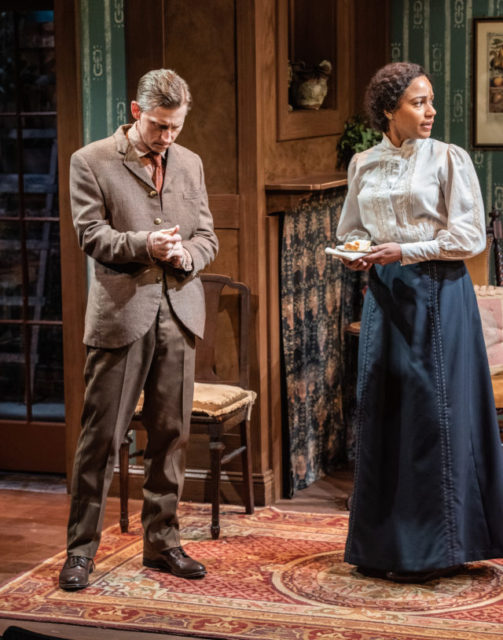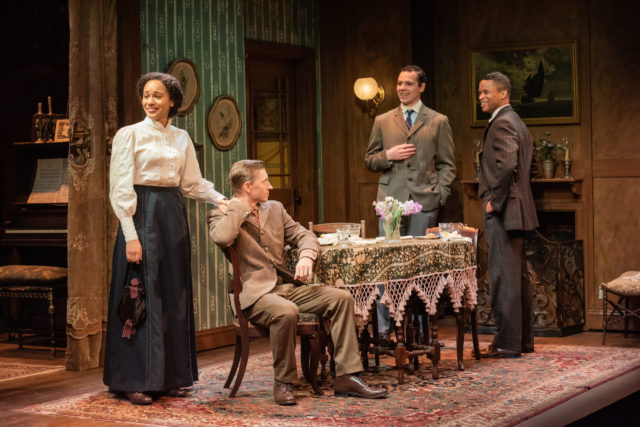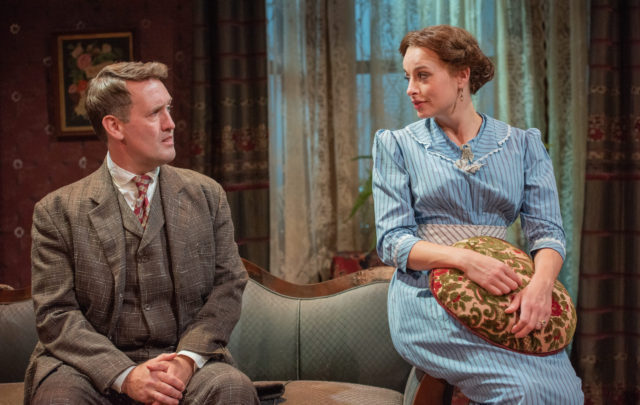
Charley (Jeremy Beck) and Lily Wilson (Laakan McHardy) face a turning point in Chains
CHAINS
The Mint Theater at Theatre Row
410 West 42nd St. between Ninth & Tenth Aves.
Tuesday – Sunday through July 17, $35-$80
minttheater.org
www.bfany.org
As live theater slowly emerged from the long pandemic lockdown, I waited with bated breath for the return of the Mint, one of New York City’s genuine treasures. For the last two years, the Mint, founded in 1992 to resurrect lost or forgotten plays, has been streaming recordings of such relatively recent successes as Conflict, Katie Roche, and Women without Men. Artistic director Jonathan Bank and the troupe are now back with its first live presentation since 2019, an exquisitely rendered adaptation of Elizabeth Baker’s 1909 working-class drama, Chains.
The second part of the Mint’s “Meet Miss Baker” series, which began with The Price of Thomas Scott, Chains was originally scheduled for the spring of 2020; the production finally opened on June 23, and the events of the past two years make it feel excitingly fresh and timely, as if it were written yesterday.
During the lockdown, many New Yorkers were overcome with wanderlust, heading to less-dense areas of America, sometimes for good. As the coronavirus crisis declined — it is still with us, of course, one example of which are the vaccine checks and masks required to enter Theatre Row, where Chains continues through July 17 — people across the country began reexamining their lives and careers, suddenly leaving their jobs, even without other prospects, what has become known as the Great Resignation. According to a Pew Research survey released this past March, “Low pay, a lack of opportunities for advancement, and feeling disrespected at work are the top reasons why Americans quit their jobs last year.” Also cited was a better balance between work and family responsibilities.
All of those aspects are at play in Chains, which is elegantly directed by Jenn Thompson with a cunning wit — she also helmed Conflict and Men without Women — and impeccably performed by a nine-person cast, most of whom portray characters who are chained down in one way or another, whether they realize it or not, primarily by capitalism and social convention.
When Fred Tennant (Peterson Townsend), a kind lodger renting a room from Charley Wilson (Jeremy Beck) and his devoted wife, Lily (Laakan McHardy), announces that he is emigrating from England and starting a new life in Australia, friends and neighbors are mostly shocked and stunned. Tennant is single and on a career path to become head clerk at his firm.
“I’m sick of the whole show. I can’t stand it any longer,” Tennant tells Charley, who, a moment later, asks, “Do you mean you are just going out because you want a change?” Tennant replies, “That’s about it. I’ve had enough of grind.” Charley points out, “Well, perhaps you’ll get grind somewhere else.” Tennant responds calmly, “It’ll be a change of grind then. That’s something.”

Elizabeth Baker’s Chains is gorgeously revived by the Mint (photo by Todd Cerveris)
The Wilsons’ big, boisterous neighbor, Morton Leslie (Brian Owen), comes bounding over the fence of Charley’s small backyard vegetable garden and chimes in, believing Tennant’s a fool for giving up his cushy gig. “He’s going to throw it away!” he proclaims. “And then I suppose he’ll be out of work over there, and we shall be hearing of the unemployment in the Colonies! It’s just this sort of thing that makes a man a Conservative. It’s what I call getting off the ladder and deliberately kicking it down.” Ironically, Leslie has a problem with the garden ladder as he tries to get home.
Lily’s twenty-two-year-old brother, Percy Massey (Avery Whitted), is in love with Sybil Frost (Claire Saunders) and wants to marry her, while Lily’s sister, Maggie (Olivia Gilliatt), is being courted by wealthy but dull-as-a-doornail widower Walter Foster (Ned Noyes). When Charley’s coworker, Thomas Fenwick (Christopher Gerson), shares some unfortunate news with him, Charley starts thinking that maybe it’s time for him to give up the daily monotony, the awful commute, the nonstop grind and head to Australia for better opportunities, then send for Lily after he’s settled. The men’s discussion is eerily contemporary, centering on “low pay, a lack of opportunities for advancement, and feeling disrespected at work,” exactly what the Pew study exposed workers complaining about more than a century later.
Charley asks his wife, “Don’t you ever get sick of it? It’s jolly hard work sometimes.” But Lily seems content with being a homemaker, following the predictable lower-middle-class suburban lifestyle, as if there was nothing else to consider.
Learning of Charley’s wanderlust, Lily’s parents (Anthony Cochrane and Amelia White), who are just fine with the status quo, are surprised and disappointed. Mrs. Massey offers, “Suppose we all stopped work when we didn’t like it? A pretty muddle the world would be in. Charley is forgetting there is such a thing as duty. . . . We’ve got to do our duty, and the more cheerfully we can do it, the better for ourselves and everybody else.” Mr. Massey argues, “Father was a plumber, and if it was good enough for him, it was good enough for me.”
The only one who recognizes what Charley is going through is Maggie, a free spirit who appreciates that there is more than the never-ending cycle of school, work, marriage, kids, retirement. She tells Charley, “I can never understand why a man gets married. He’s got so many chances to see the world and do things — and then he goes and marries and settles down and is a family man before he’s twenty-four.” Charley replies, “It’s a habit.” Maggie adds, “If I were a man I wouldn’t stay in England another week. I wouldn’t be a quill-driver all my life.”
Puffing away on his pipe, Charley has a major decision to make that affects more than just him, a choice that many in the audience can relate to.

Wealthy but dull Walter (Ned Noyes) woos Maggie (Olivia Gilliatt) in Chains (photo by Todd Cerveris)
Chains switches between two locations: the Wilsons’ sitting room in Hammersmith, with a fireplace on the right, the kitchen table at the center, and a parlor in the back, and the Massey living room, with a comfy couch, a cozy nook, and a piano. Both sets are gorgeously designed by John McDermott; one of the Mint’s trademarks is its consistently beautiful stage design and its magical change of sets, which is usually done during intermission but here is saved for the beginning of the second act so everyone can experience its wonder. The Edwardian costumes are by David Toser, with lighting by Paul Miller and sound by M. Florian Staab. To further Charley’s sense of captivity, there are repeated images of small chains on the Wilsons’ wallpaper.
Beck, who starred in two of the Mint’s best recent productions, Conflict and Hindle Wakes, is sublime as Charley, bringing a Daniel Craig–like quality to the role of a man who abruptly decides that he needs more out of life, unsatisfied with his current circumstances and unhappy that it’s precisely what’s expected of him. When he looks at Tennant’s map of Australia, we are examining it with him, as if searching for our own possibilities of seeking something new.
The rest of the cast is superb, led by McHardy (The Wolves, Mac Beth) in her off-Broadway debut as the gentle, doe-eyed Lily and Gilliatt (Pushkin, Mother of the Maid) as her far more adventurous sister. Owen (Dog Man: The Musical, Baskerville: A Sherlock Holmes Mystery) nearly shakes the house as Leslie, towering over everyone else.
Thompson’s (The Gravedigger’s Lullaby, Abundance) direction is richly harmonic, allowing former stenographer Baker’s words to sing. It’s a song many of us have listened to, and many more are terrified of or reject outright. At one point, Fenwick says to Charley, “What can I do? Stay, of course — what else is there?”
What else is there? As Baker (Edith, Partnership), in her first play, reveals, there’s a whole world out there to be explored, onstage and off. And as we now know, sometimes it takes a pandemic for people to break out of the chains of their self-imposed bondage.